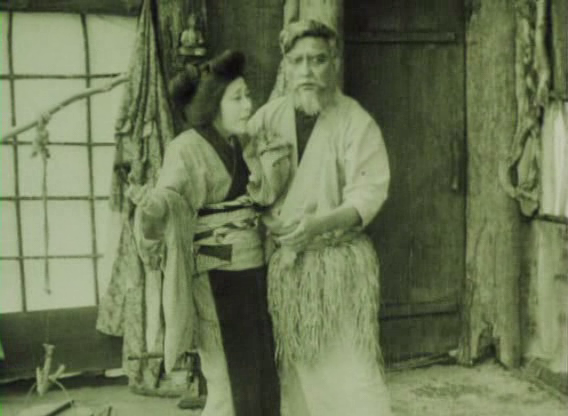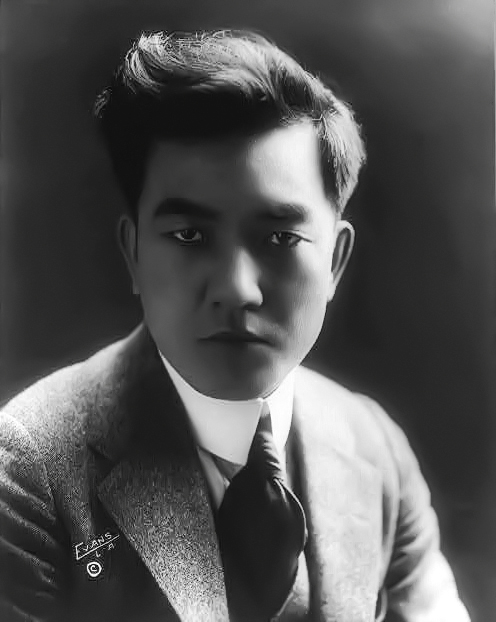 While he is best known for his role as the Japanese camp commander in The Bridge on the River Kwai, and other films of the 1950s, Sessue Hayakawa was a superstar in the silent era. Among Hollywood’s highest payed stars, he was in the same league with Fairbanks, Chaplin and Valentino. He founded his own production company because he resented the misrepresentation of Asians in Hollywood films. A meticulous actor, he was highly influential in transforming film acting methods from the broad gestures inherited from stage acting to the more restrained techniques appropriate to film. This film, the second one in which he appeared, was a story with a Japanese setting. A castaway sailor courts a young girl who has been forbidden to marry by a temple prophecy. Hayakawa was a young man, having just dropped out of the University of Chicago, where he studied economics, but he appears in heavy makeup as the heroine’s elderly father. The film displays the older, melodramatic style of acting that Hayakawa was soon to change. The leading female role was played by Tsuru Aoki, whom Hayakawa fell in love with and married during the production. Despite the dated acting techniques, the film holds up well, with some exciting action scenes at sea, and some moving moments.
While he is best known for his role as the Japanese camp commander in The Bridge on the River Kwai, and other films of the 1950s, Sessue Hayakawa was a superstar in the silent era. Among Hollywood’s highest payed stars, he was in the same league with Fairbanks, Chaplin and Valentino. He founded his own production company because he resented the misrepresentation of Asians in Hollywood films. A meticulous actor, he was highly influential in transforming film acting methods from the broad gestures inherited from stage acting to the more restrained techniques appropriate to film. This film, the second one in which he appeared, was a story with a Japanese setting. A castaway sailor courts a young girl who has been forbidden to marry by a temple prophecy. Hayakawa was a young man, having just dropped out of the University of Chicago, where he studied economics, but he appears in heavy makeup as the heroine’s elderly father. The film displays the older, melodramatic style of acting that Hayakawa was soon to change. The leading female role was played by Tsuru Aoki, whom Hayakawa fell in love with and married during the production. Despite the dated acting techniques, the film holds up well, with some exciting action scenes at sea, and some moving moments.

Hayakawa in 1918, four years after this film was made.
Hayakawa led an interesting life. As a teenager in Japan, he attempted seppuku after failing to qualify for the naval career his upper class family had planned for him. He played quarterback in American college football. He stumbled into acting by accident while waiting for a ship home, rocketing to stardom with his good looks. He made fortunes and lost them gambling, lived extravagantly, and became a social lion by buying up a huge stock of liquor just before Prohibition was enacted. He wrote several plays and a novel. He produced a version of The Three Musketeers in Japan. For awhile, broke and out of work, he supported himself by painting watercolours. He moved to France to make films in which he would not be racially stereotyped — and ended up fighting in the French Resistance. As an middle-aged man, he was able to take on a crowd of young Mexican toughs in a brawl and defeat them handily. He retired to become a Zen master and tutor. Some of his roles won him accolades as a mature actor, but he was never popular in Japan, where he was considered “too American.”
- .
Asian actors in Hollywood faced complex challenges, performing in the limelight of a society that held bizarre and sometimes disgusting attitudes about race and ethnicity. In the 1920’s, America’s anti-miscegenation laws influenced all casting, script-writing and performance. In the 1930’s the rise of anti-Japanese sentiments and the pervasive censorship of films did further damage. To weave their way through these obstacles, Asians had to be resourceful and strong. Their achievements should not be forgotten.
0 Comments.